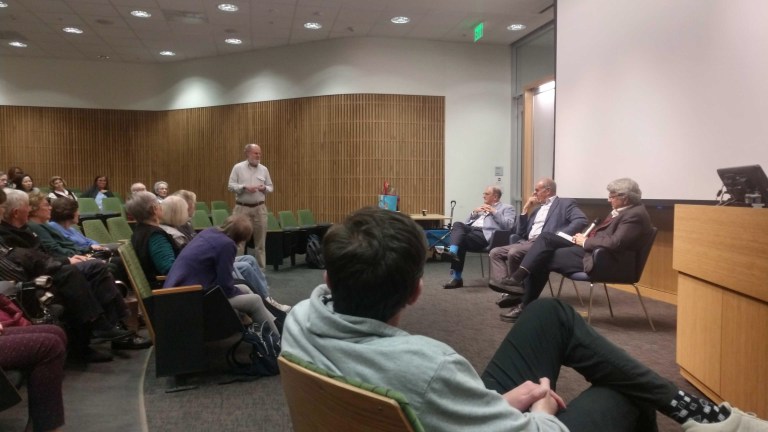Three professors debated the significance of Super Tuesday to the 2020 presidential election in a panel hosted by the Bill Lane Center for the American West and the Stanford University Women’s Club on Thursday.
They argued that Super Tuesday is the result of a multi-year trend of ideological division within the Democratic Party, discussed the strategies of each campaign and previewed a possible matchup between former Vice President Joe Biden and President Donald Trump in the general election.
Political science professor David Brady said the key to understanding the results of the primary process thus far is the divide within the Democratic party between “very liberal” voters and the rest of the party. According to Brady, “very liberal” voters are more likely to support Medicare for All and the Green New Deal. They are also more satisfied with the field of Democratic candidates running for president.
“At the present time, there are 14% more ‘very liberals,’ 4% fewer ‘liberals’ and 11% fewer ‘moderates’ and ‘conservatives’” within the Democratic Party than in 2008, Brady said.
Despite the growth of the “very liberal” wing, L. Sandy Maisel, professor of American government at Colby College, said that “’very liberal’ Democrats by self-identification [are] just slightly more than a quarter of the Democratic Party.”
According to Brady, Biden’s recent success has been the result of more moderate voters realizing Sen. Bernie Sanders (I-Vt.) could be the Democratic nominee.
“After Nevada, people were looking at [the race] and saying, ‘Whoa. [Sanders] could be the nominee,’” he said. “And moderates and liberals moved away from him in droves. And that’s what caused what happened in Super Tuesday.”
Maisel focused on the strategies of the three candidates that are remaining in the race. He said Biden’s goal is to continue the momentum he won on Super Tuesday, while Sanders needs to continue “getting new voters and working-class Democrats to come out to vote as they have never come out to vote before.”
“I have no idea what Tulsi Gabbard is doing,” he added.
Bruce Cain, director of the Bill Lane Center and a political science professor, looked ahead to the next states to vote in the primary, and to a potential general election matchup between Biden and Trump.
“Biden cannot run as a wonk,” he said. “I say this because Democrats prefer policy-wonk presidents.”
He argued that Biden would not fare well in a policy-focused debate against Trump, and implored Biden to “keep it simple” should such a case arise.
In order for Biden to be declared the nominee, Cain said that it is important for the former vice president to secure the plurality of delegates. It might be difficult for Biden regardless, Cain said, if Sanders continues his candidacy into the Democratic National Convention.
“And it’s going to be very hard, maybe impossible, if Sanders stays in until the bitter end — which I think he probably will do — for Biden to get to 1,991 [delegates], he said. “I think it’s gonna be pretty hard, so there’s a real importance for Biden to get the plurality.”
In an interview with MSNBC’s Rachel Maddow ’94 on Wednesday, Sanders said he will drop out of the presidential race if Biden receives a plurality of delegates before the Democratic National Convention.
Contact Michael Espinosa at mesp2021 ‘at’ stanford.edu.
